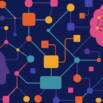
[50% Off] Certified Generative Ai Architect With Knowledge Graphs
Design and Deploy Scalable GenAI Systems with Ontologies, RAG, and Multi-Agent Architectures
What you’ll learn
- Design end-to-end Generative AI architectures that combine LLMs, retrieval-augmented generation (RAG), agent workflows, and knowledge graphs.
- Model and implement ontologies and semantic knowledge graphs using tools like Protégé, RDF/OWL standards, and graph databases such as Neo4j or Stardog.
- Build hybrid retrieval systems that integrate vector search (FAISS, Pinecone, Weaviate) with graph-based semantic querying for enhanced context and relevance.
- Develop multi-agent GenAI applications using LangGraph, AutoGen, or CrewAI, enabling memory-aware, tool-using, and role-based intelligent agents.
- Deploy and scale GenAI systems in cloud-native environments using Docker, Kubernetes, AWS Fargate, and Azure Container Apps with observability and monitoring.
- Translate business problems into knowledge-driven AI solutions and deliver stakeholder-ready architecture, documentation, and ROI narratives.
Requirements
- Basic understanding of AI/ML concepts (e.g., what LLMs, embeddings, and APIs are).
- Familiarity with Python programming (intermediate level preferred for building pipelines and agent workflows).
- Experience with cloud platforms such as AWS, Azure, or GCP (basic knowledge of compute, storage, and containers is helpful).
- Interest or experience in semantic technologies like RDF, OWL, or graph databases (no prior mastery required).
- A laptop or workstation with an internet connection and access to tools.
- No formal degree or prior knowledge of knowledge graphs or agents is required—everything will be explained step by step through interactive labs, visuals, and walkthroughs.
Description
The Certified Generative AI Architect with Knowledge Graphs program is a comprehensive, advanced-level certification designed to equip professionals with the tools, frameworks, and hands-on experience to architect cutting-edge Generative AI (GenAI) systems that are intelligent, explainable, and scalable. This course combines the power of Large Language Models (LLMs), Knowledge Graphs, Retrieval-Augmented Generation (RAG), and agent-based orchestration to help you build production-grade AI solutions that go beyond simple prompt engineering.
You’ll begin by mastering the foundations of GenAI architecture, including the capabilities of modern LLMs, the rise of agentic AI systems, and how memory, context, and reasoning enhance performance. You’ll explore the anatomy of RAG pipelines, dive into context-aware generation, and set the stage for knowledge-enhanced AI applications.
From there, we’ll delve deep into semantic technologies. You’ll learn to design and build ontologies using tools like Protégé and TopBraid Composer, construct and query graph databases using RDF, OWL, SPARQL, and Cypher, and manage the lifecycle of enterprise-grade knowledge systems. This enables you to drive semantic search, entity disambiguation, and structured reasoning in real-world deployments.
The course also covers how to build hybrid retrieval systems by integrating vector databases like FAISS, Weaviate, and Pinecone with graph-based reasoning. You’ll implement advanced RAG pipelines that combine semantic filtering, graph traversal, and vector similarity to improve contextual relevance and reduce hallucinations in LLM outputs.
In the advanced sections, you’ll orchestrate multi-agent GenAI systems using frameworks like LangGraph, CrewAI, and AutoGen. These agents will collaborate across planning, retrieval, reasoning, and summarization tasks—enabling intelligent workflows that are modular, traceable, and extensible.
You’ll also learn cloud-native deployment strategies across AWS, Azure, and GCP, mastering containerization, Kubernetes, and serverless architectures for scalable GenAI APIs. Monitoring, observability, and secure rollout patterns are all covered, ensuring your solutions are enterprise-ready.
To bring it all together, you’ll engage in a capstone project where you define a business problem, create an ontology, build a knowledge graph-enabled RAG pipeline, deploy a multi-agent application to the cloud, and present your solution with full documentation and executive-ready architecture blueprints.
This course is ideal for AI architects, ML engineers, semantic web practitioners, and cloud-native developers seeking to lead the next wave of intelligent, knowledge-aware AI systems.
Whether you’re building AI for healthcare, legal tech, finance, or retail—this certification will help you deliver impactful, explainable, and future-proof GenAI systems powered by knowledge graphs.
Author(s): Vivian Aranha, School of AI








